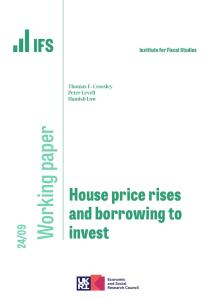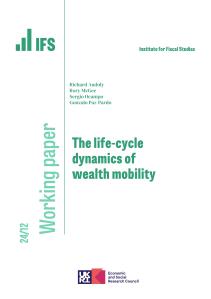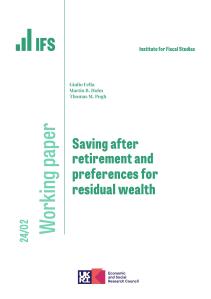Summary
When left to their own devices, few individuals choose to purchase an annuity. Following the 2015 ‘pension freedoms’ reforms, the amount of annuity purchases in the UK has fallen substantially. Around 12% of newly-accessed defined contribution pension pots are now used to buy an annuity. This stands in contrast to economic models which suggest that individuals should be keen to insure against the risk that they exhaust their wealth if they happen to live for a long time. New work by IFS researchers shows that an important part of this ‘annuity puzzle’ can be explained by the fact that many of those in their 50s and 60s underestimate their true chances of surviving to older ages.
Annuities allow people to purchase a guaranteed income, to be paid out for as long as they live. These products are potentially very valuable to those who wish to guard against the prospect of exhausting their wealth if they happen to live for a long time. Despite this potential benefit, very few individuals voluntarily buy an annuity, something economists have termed the ‘annuities puzzle’. New IFS research shows that one potential reason for low annuity demand is that the vast majority of individuals in their 50s and 60s underestimate their chances of survival to older ages in a way that is consistent with them under-valuing an annuity whose price reflects actual survival rates.
This research come against a backdrop of increasing individual choice and flexibility in relation to the use of defined contribution (DC) pension wealth in retirement in the UK. Prior to April 2014, unless they had a DC pension pot of under £18,000 or already had a guaranteed income of at least £20,000 per year, individuals had to either purchase an annuity (or drawdown an income up to 120% of the value of an annuity income) or be faced with a tax rate of 55% on withdrawals from DC pots. Since April 2015, these restrictions have been removed and all those aged 55 and over can access any amount of their DC pension pot and pay only their marginal income tax rate. Annuity purchases fell significantly in the period following these reforms. While 90% of DC pots accessed in 2013 were used to purchase an annuity, this figure has fallen and appears to have stabilised at around 12% of pots since April 2015 (FCA). When given the choice, many individuals do not annuitise.
There are, of course, a range of different reasons why individuals may not choose to annuitise their wealth. Underestimating survival chances is likely just one part of the picture. People might also choose not to buy annuities because they anticipate having to make large one-off expenditures, because they want to pass on some wealth to their children, because they believe they can achieve a higher rate of return, or because they already feel sufficiently provided for by the state pension, for example. Each of these reasons carries different implications about the value of annuities to individuals and the best design of policy, and so understanding the underlying drivers of behaviour is important.
In this new research, we draw upon the responses of a representative sample of individuals in England aged 50 and over who were asked how likely they thought it was that they would survive beyond particular older ages. Previous IFS research analysed responses to these survival expectations questions and found that, on average, individuals in their 50s and 60s substantially underestimated their chances of survival through their 70s and 80s. For example, men and women in their 50s and 60s underestimated their chances of survival to age 75 by 20 percentage points, on average. For the overwhelming majority of individuals in their 50s and 60s, this survival ‘pessimism’ has the potential to explain why they would view an annuity that is priced in an ‘actuarially fair’ way (i.e. has a price which is equal to the value of the total income payments which people would on average receive from the annuity) as offering a less than fair level of income.
People who believe that an annuity product offers them a low income may still choose to buy it if the insurance value it gives them is great enough. In other words, if someone is sufficiently worried about the chance of outliving their financial resources, they may choose to buy an annuity even if they think that, on average, it will return them less than they paid for it.
In order to assess whether people’s underestimation of their survival chances is large enough to outweigh this insurance motive, we employ an economic model of savings and consumption. This allows us to predict how many individuals would, under conventional assumptions about decision-making, choose to use their accumulated pension savings to buy a fairly priced, index-linked annuity. To explore the importance of individuals’ subjective expectations for their choice, we calculate the proportion of individuals that the model predicts would choose to annuitise when acting in accordance with their elicited subjective survival expectations. We compare this to the proportion predicted to annuitise when acting in accordance with average ‘objective’ survival probabilities for someone of their age and sex.
We predict much lower levels of annuitisation when using ‘subjective’ as compared to ‘objective’ survival probabilities. The exact quantitative predictions of the model depend on how concerned individuals are assumed to be about the possibility of exhausting their wealth if they happen to live for a long time. For levels of concern commonly assumed by economists, annuitisation rates are over 90% when using ‘objective’ survival probabilities but fall to around 50%-60% when using ‘subjective’ survival probabilities. The drop in demand is greater (smaller) if we assume that individuals are less (more) concerned about the possibility of exhausting their wealth in retirement.
This research provides strong new evidence that the underestimation of survival chances may be a significant factor explaining why people choose not to annuitise their wealth. This suggests that both public policy-makers and those in the pensions and insurance industry should be mindful of the possibility that individuals who choose not to annuitise because they underestimate their longevity may be failing to buy a product which in fact offers them good value insurance of their income in older age.
Note
This research was funded by the Economic and Social Research Council (ESRC) through a Knowledge Exchange Grant and an ESRC Secondary Data Initiative grant (reference ES/N011872/1), and by the 2015-2018 IFS Retirement Savings Consortium. The 2015-2018 IFS Retirement Savings Consortium comprises Age UK, Association of British Insurers, Chartered Insurance Institute, Department for Work and Pensions, HM Revenue and Customs, HM Treasury, Investment Association, Legal and General Investment Management, Money Advice Service, and Tax Incentivised Savings Association. We also recognise support from the ESRC Centre for the Microeconomic Analysis of Public Policy (CPP) at IFS.









